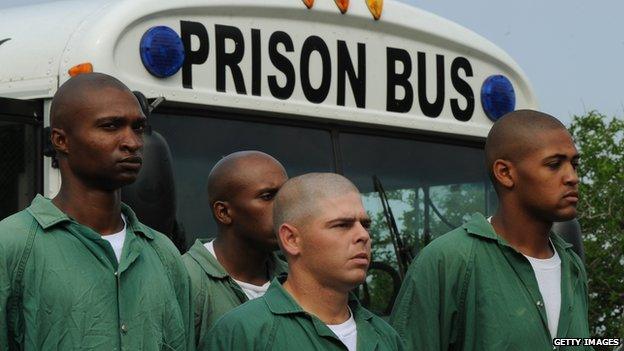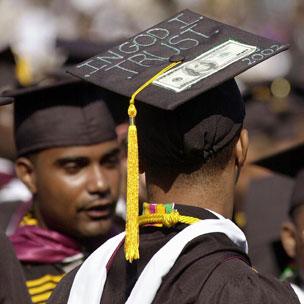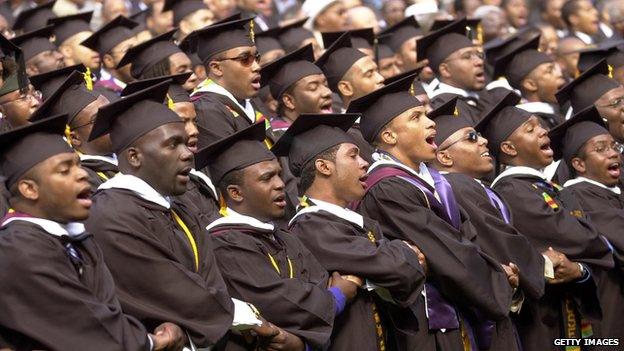Are there more US black men in prison or college?
- Published

Are there more black men in prison than in college in the United States?
It's an oft-repeated claim that there are more black men in prison in the US than in college. It's a good statistic that apparently gets to the heart of the problem of inequality in the US, but is it having a negative effect on young black men? And, more importantly, is it true?
In 2007, before he became a presidential candidate, Barack Obama took to the stage to address The National Association for the Advancement of Colored People (NAACP)
"I know what you know," he said. "Despite all the progress that has been made, we still have more work to do. We have more work to do when more young black men languish in prison than attend universities and colleges across America."
The statement was greeted with cheering and applause. It was a rallying cry for the activists in the room to continue their fight against inequality.

The claim about African-Americans and college attendance was first published in 2002
One man who saw the power of the statement was Ivory Toldson - associate professor of psychology at Howard University in Washington DC and editor-in-chief of The Journal of Negro Education.
He has used the statistic himself in one of his own publications, but became aware that the continuing repetition was having a negative effect on young black men.
"These are young black males who are trying to figure it out. They know that they could do better and I started to feel that a lot of the statistics that we were using were more of a burden to them," he says.
Despite this, the original claim can still be heard today.
"My last time hearing it was last Friday (7 March) at the Howard University Charter Day programme - it was the keynote speaker," Toldson says.
His reaction? "Here we go again."
Long before this, Toldson had noticed an interesting trend.
"I found that year after year we were gaining lots of black males in college," he says. But the prison population was remaining relatively static.
A close look at the figures for 2009 showed that there were 600,000 more black male college and university students than black male prisoners. The story so often repeated was not true.
But had it been true before?
The statistic was first published by the campaign group The Justice Policy Institute, external in 2002, using figures from 2000.
Toldson compared those figures with the latest data, and noticed a suspicious jump in the number of black students attending college and university.
"How did we get a 108% jump in the black male college population?" he says. "It didn't seem feasible for us to achieve that in only 10 years," he says.
He found that a number of colleges reporting a lot of black students today, had reported none, or very few, back in 2000 - results he wrote up in a recent article for The Root, external.
"The first thing that jumped out was that right now there are 4,700 colleges that report black students. Ten years ago there were about 3,000," he says.

There are more than 100 historically black colleges and universities in the US
He found a number of historically black colleges and universities hadn't reported any black students in the first survey, including his own alma-mater Temple University in Philadelphia, where he was a student at the time.
Comparing the reported figures with census data from the time, he thinks that the original figures underestimated the number of black students by about 100,000 - and that there were more black men in college and university than in prison, even in 2000.
The Justice Policy Institute does not agree the original comparison was necessarily wrong.
"I cannot verify if it was wrong," says senior researcher Melissa Neal. "Perhaps if all colleges were reporting, the statistic would still have been true. There's no way we can go back 13 years from now and pull that up."
But she does acknowledge that the report was based on limited data.
"At that time I'm not sure our researchers were really thinking about the number of colleges reporting. That was not a limitation we clearly expressed in our write up. I recognise we probably should have done a better job of that."
She says that while she's pleased that the gap between the number of black men in college and the number in prison is widening, there are still problems that need addressing.
"The reality is that African-American males are still disproportionately channelled into the criminal justice system and they are still not achieving, or able to have the same educational success as their peers of other races and other ethnicities," she says.
Black people account for 40% of the prison population in the US, but only 12% of the population overall.
And, according to Toldson, black men still lag behind their white counterparts in terms of attendance at top-rated universities. The proportion of black male students who drop out before graduation is also higher than average.
So, he and the Justice Policy Institute agree on one thing - there is still work to be done.